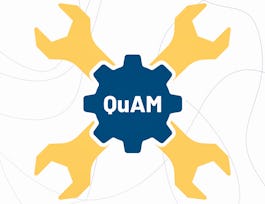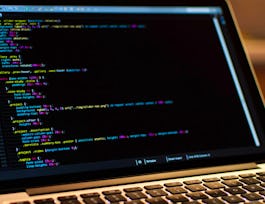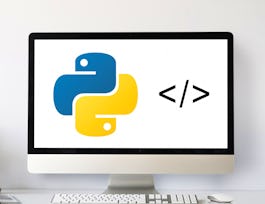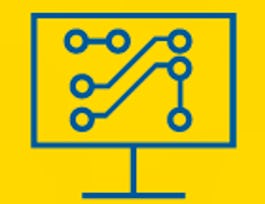Embark on a transformative learning experience designed to equip you with a robust understanding of AI, machine learning, and Python programming. This course begins with a thorough introduction to artificial intelligence and machine learning, demystifying the core concepts and exploring how algorithms and data-driven techniques empower computers to learn and adapt. As you progress, you'll delve into the architecture of deep learning and neural networks, grasping how these advanced structures mimic human cognition to process complex data and make accurate predictions.



Fundamentals of AI, Machine Learning, and Python Programming
This course is part of Keras Deep Learning & Generative Adversarial Networks (GAN) Specialization

Instructor: Packt - Course Instructors
Sponsored by Coursera Learning Team
Recommended experience
What you'll learn
Identify and define the core concepts of AI and machine learning
Explain Python programming fundamentals, including flow control mechanisms, data structures, and functions
Utilize essential Python libraries such as NumPy, Matplotlib, and Pandas for data manipulation and visualization
Develop and train neural networks using deep learning frameworks like TensorFlow and PyTorch, understanding their architecture and functioning
Details to know

Add to your LinkedIn profile
11 assignments
September 2024
See how employees at top companies are mastering in-demand skills

Build your subject-matter expertise
- Learn new concepts from industry experts
- Gain a foundational understanding of a subject or tool
- Develop job-relevant skills with hands-on projects
- Earn a shareable career certificate


Earn a career certificate
Add this credential to your LinkedIn profile, resume, or CV
Share it on social media and in your performance review

There are 30 modules in this course
In this module, we will provide a comprehensive introduction to the course. We’ll outline the key topics covered, focusing on deep learning, neural networks, and Generative Adversarial Networks (GANs). This overview will set the stage for your learning journey, giving you a clear roadmap of what to expect.
What's included
1 video2 readings
In this module, we will introduce you to the fundamental concepts of artificial intelligence and machine learning. You will learn how AI and machine learning algorithms empower computers to learn, adapt, and make informed decisions based on data.
What's included
1 video
In this module, we will delve into the basics of deep learning and neural networks. We’ll explore how these powerful models are structured and how they process complex data to make predictions, mimicking the way humans learn.
What's included
1 video1 assignment
In this module, we will guide you through the process of setting up your computer by installing Anaconda. You will learn how to create isolated environments and manage packages, laying a solid foundation for your data science and machine learning projects.
What's included
1 video
In this module, we will cover the essentials of Python flow control mechanisms. You will learn how to manipulate the sequence of code execution, using conditional statements and loops to manage the flow of your programs effectively.
What's included
2 videos
In this module, we will explore the basics of Python lists and tuples. You will understand their properties and how they can be used to organize and manipulate data efficiently in your Python programs.
What's included
1 video1 assignment
In this module, we will delve into Python dictionaries and functions. You will learn how to use dictionaries for dynamic data storage and how to create and utilize functions to streamline your code and improve efficiency.
What's included
2 videos
In this module, we will introduce you to NumPy, a critical library for numerical computations in Python. You will learn how to create and manipulate multidimensional arrays, gaining tools to perform efficient data analysis.
What's included
2 videos
In this module, we will explore the Matplotlib library for data visualization. You will learn how to transform data into insightful visual representations, using plots and histograms to better understand data distributions and patterns.
What's included
2 videos1 assignment
In this module, we will dive into the Pandas library, focusing on its powerful data structures: series and data frames. You will learn how to leverage these tools for effective data analysis and manipulation.
What's included
2 videos
In this module, we will guide you through installing essential deep learning libraries such as TensorFlow and PyTorch. You will learn how to set up these libraries, preparing you for your deep learning journey.
What's included
1 video
In this module, we will explore the basic structure of artificial neurons and neural networks. You will learn about the building blocks of these models and how they work together to perform complex computations and pattern recognition.
What's included
1 video1 assignment
In this module, we will introduce you to activation functions, which are crucial in shaping the outputs of neural networks. You will understand their role in the learning process and how they impact model performance.
What's included
1 video
In this module, we will explore popular types of activation functions used in neural networks. You will learn how these functions drive information flow and affect the overall performance of your models.
What's included
1 video
In this module, we will demystify popular loss functions used in training neural networks. You will learn about mean squared error, cross-entropy, and more, understanding how these functions help in refining model predictions.
What's included
1 video1 assignment
In this module, we will unravel the world of popular optimizers. You will learn how various algorithms optimize the training of neural networks, improving model accuracy and efficiency.
What's included
1 video
In this module, we will explore popular types of neural networks. You will learn about feedforward, convolutional, recurrent networks, and more, understanding their unique architectures and applications in machine learning and AI.
What's included
1 video
In this module, we will begin the process of building a regression model to predict house prices in King County, USA. You will learn how to fetch and load datasets, setting the stage for effective data analysis and model training.
What's included
1 video1 assignment
In this module, we will dive into exploratory data analysis (EDA) and data preparation. You will learn how to clean and transform data, ensuring it is ready for building accurate and effective machine learning models.
What's included
2 videos
In this module, we will define the Keras model for our regression task. You will learn how to architect the model, setting up the input, hidden, and output layers to create a robust neural network.
What's included
2 videos
In this module, we will compile and fit our Keras model. You will learn how to configure the model’s parameters and train it using the prepared dataset, optimizing its performance for accurate predictions.
What's included
1 video1 assignment
In this module, we will focus on visualizing the training progress and metrics of our model. You will learn how to use graphs and plots to gain insights into model performance and make necessary adjustments for improvement.
What's included
1 video
In this module, we will use our trained regression model to predict house prices. You will see the model in action, applying machine learning principles to real-world data and making accurate predictions.
What's included
1 video
In this module, we will introduce the creation of a binary classification model for heart disease prediction. You will learn the importance of such models in healthcare and the steps involved in building one.
What's included
1 video1 assignment
In this module, we will guide you through fetching and loading the necessary data for heart disease prediction. You will learn how to prepare the data, setting a solid foundation for building an effective classification model.
What's included
1 video
In this module, we will delve into exploratory data analysis (EDA) and data preparation for our heart disease classification model. You will learn how to clean and transform the data, ensuring it is ready for model training.
What's included
2 videos
In this module, we will define the architecture of our heart disease classification model. You will learn how to set up the neural network, configuring layers and activations for optimal performance.
What's included
1 video1 assignment
In this module, we will compile, fit, and plot our heart disease classification model. You will learn how to train the model and visualize its performance using key metrics and plots.
What's included
1 video
In this module, we will use our trained classification model to predict heart disease. You will see the model in action, applying machine learning principles to healthcare data and making accurate classifications.
What's included
1 video
In this module, we will test and evaluate our heart disease classification model using new data. You will learn how to assess the model’s accuracy and refine it for better performance in predicting heart disease.
What's included
2 videos1 reading2 assignments
Instructor

Offered by
Why people choose Coursera for their career




Recommended if you're interested in Data Science

Alberta Machine Intelligence Institute

Arizona State University

Open new doors with Coursera Plus
Unlimited access to 10,000+ world-class courses, hands-on projects, and job-ready certificate programs - all included in your subscription
Advance your career with an online degree
Earn a degree from world-class universities - 100% online
Join over 3,400 global companies that choose Coursera for Business
Upskill your employees to excel in the digital economy




